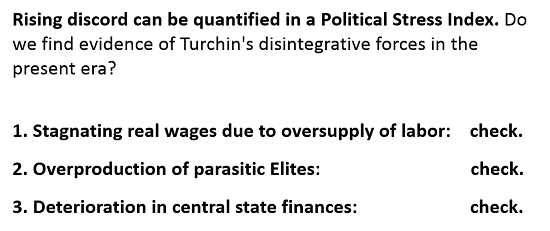The nation is fragmenting because the Status Quo is failing the majority of the citizenry.
The core narrative of the Status Quo is that nothing fundamental needs to be changed: all the problems can be solved with more "free money" (borrowed from the future at low rates of interest) and a few policy tweaks such as Universal Basic Income (UBI) (the topic of my new book
Money and Work Unchained).
This core narrative is false: everything needs to change, from the bottom up.And that of course terrifies those gorging at the trough of status quo wealth and power.
The power structure can manipulate financial metrics, but it can't manipulate rising wealth/power inequality or social discord. Whatever you think of President Trump, his election is a symptom of profound social discord--discord which author Peter Turchin explains is cyclical and cannot be squashed with phony reforms like UBI or police-state repression.
The nation is fragmenting because the Status Quo is failing the majority of the citizenry. The protected few are reaping all the benefits of the Status Quo, at the expense of the unprotected many.
As I have outlined many times, this unsustainable asymmetry is the only possible outcome of our socio-economic system, which is dominated by these forces:
1. Globalization--free flow of capital, labor arbitrage (workers must compete with the lowest-cost labor around the world).
2. Nearly free money from central banks for bankers, financiers and corporations.
3. Pay-to-play "democracy"-- wealth casts the only votes that count.
4. State protected cartels that privatize gains and socialize losses.
5. A political system stripped of self-correcting feedback and accountability.
Once you understand the inputs and structure, you realize there is no other possible output other than unsustainably expanding debt and wealth/income inequality. Policy tweaks cannot change the output; all they do is provide an illusion of reform that serves the need of those at the top to obscure the systemic injustices and unsustainability of the extractive, exploitive, predatory, parasitic system that's enriching them.
What do people do when centralized systems fail to deliver what was promised? They fragment into smaller "tribes" and find fewer reasons to cooperate in centralized systems. As historian-economist Turchin explained in his 2016 book
Ages of Discord, human history manifests cycles of social disintegration and integration in which the impulse to cooperate in large social structures waxes and wanes.
Turchin identified 25-year cycles that combine into roughly 50-year cycles, comparable (though not identical with) Kondratieff's proposed economic cycles.
These 50-year cycles are part of longer 150 to 200-year cycles that move from cooperation through an age of discord and disintegration to a new era of cooperation.
Turchin's model identifies three primary forces in these cycles:
1. An over-supply of labor that suppresses real (inflation-adjusted) wages
2. An overproduction of essentially parasitic Elites
3. A deterioration in central state finances (over-indebtedness, decline in tax revenues, increase in state dependents, fiscal burdens of war, etc.)
These combine to influence the social order, which is characterized in eras of discord by declining loyalty to self-serving special interests (disintegration) and in eras of cooperation by a willingness to compromise for the good of the entire society (integration).
NOTE: Contributions/subscriptions are acknowledged in the order received. Your name and email remain confidential and will not be given to any other individual, company or agency.
Thank you, Charles L. ($5/month), for your marvelously generous pledge to this site -- I am greatly honored by your support and readership.
| |
Thank you, Pierre D. ($5/month), for your splendidly generous pledge to this site -- I am greatly honored by your support and readership.
|




























